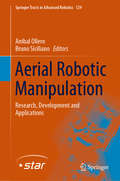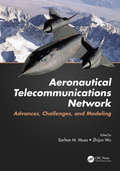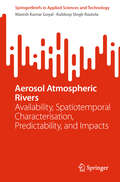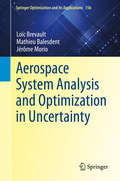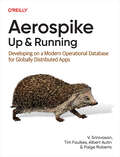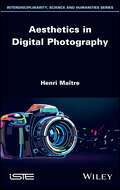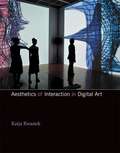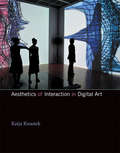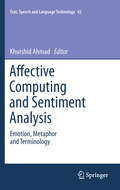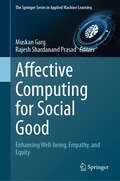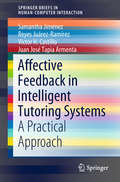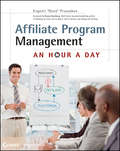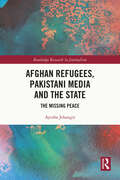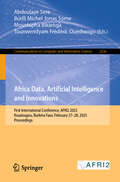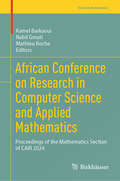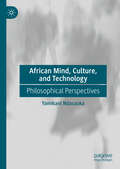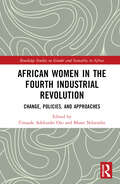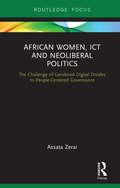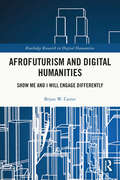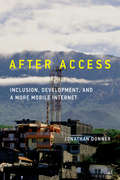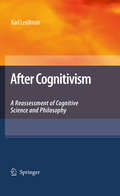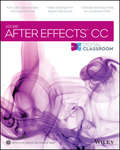- Table View
- List View
Aerial Robotic Manipulation: Research, Development and Applications (Springer Tracts in Advanced Robotics #129)
by Anibal Ollero Bruno SicilianoAerial robotic manipulation integrates concepts and technologies coming from unmanned aerial systems and robotics manipulation. It includes not only kinematic, dynamics, aerodynamics and control but also perception, planning, design aspects, mechatronics and cooperation between several aerial robotics manipulators. All these topics are considered in this book in which the main research and development approaches in aerial robotic manipulation are presented, including the description of relevant systems. In addition of the research aspects, the book also includes the deployment of real systems both indoors and outdoors, which is a relevant characteristic of the book because most results of aerial robotic manipulation have been validated only indoor using motion tracking systems. Moreover, the book presents two relevant applications: structure assembly and inspection and maintenance, which has started to be applied in the industry. The Chapters of the book will present results of two main European Robotics Projects in aerial robotics manipulation: FP7 ARCAS and H2020 AEROARMS. FP7 ARCAS defined the basic concepts on aerial robotic manipulation, including cooperative manipulation. The H2020 AEROARMS on aerial robot with multiple arms and advanced manipulation capabilities for inspection and maintenance has two general objectives: (1) development of advanced aerial robotic manipulation methods and technologies, including manipulation with dual arms and multi-directional thrusters aerial platforms; and (2) application to the inspection and maintenance.
Aeronautical Telecommunications Network: Advances, Challenges, and Modeling
by Sarhan M. Musa Zhijun WuAddresses the Challenges of Modern-Day Air TrafficAir traffic control (ATC) directs aircraft in the sky and on the ground to safety, while the Aeronautical Telecommunications Network (ATN) comprises all systems and phases that assist in aircraft departure and landing. The Aeronautical Telecommunications Network: Advances, Challenges, and Mod
Aerosol Atmospheric Rivers: Availability, Spatiotemporal Characterisation, Predictability, and Impacts (SpringerBriefs in Applied Sciences and Technology)
by Manish Kumar Goyal Kuldeep Singh RautelaThis book thoroughly examines aerosol pollution and aerosol atmospheric rivers (narrow corridors of concentrated suspended aerosols in the sky), exploring their significant effects on human health, the environment, and global climate. Readers will find detailed discussions on these phenomena' sources, composition, patterns, and advanced methods for their detection, monitoring, and mitigation. Each chapter examines the complex dynamics of aerosol atmospheric rivers and the use of data mining and artificial intelligence in analyzing aerosol pollution. The book also highlights the interactions between aerosol pollution, aerosol atmospheric rivers, and particulate matter concentrations with associated risk, offering practical adaptation, mitigation, and resilience strategies.
Aerospace System Analysis and Optimization in Uncertainty (Springer Optimization and Its Applications #156)
by Loïc Brevault Mathieu Balesdent Jérôme MorioSpotlighting the field of Multidisciplinary Design Optimization (MDO), this book illustrates and implements state-of-the-art methodologies within the complex process of aerospace system design under uncertainties. The book provides approaches to integrating a multitude of components and constraints with the ultimate goal of reducing design cycles. Insights on a vast assortment of problems are provided, including discipline modeling, sensitivity analysis, uncertainty propagation, reliability analysis, and global multidisciplinary optimization. The extensive range of topics covered include areas of current open research. This Work is destined to become a fundamental reference for aerospace systems engineers, researchers, as well as for practitioners and engineers working in areas of optimization and uncertainty. Part I is largely comprised of fundamentals. Part II presents methodologies for single discipline problems with a review of existing uncertainty propagation, reliability analysis, and optimization techniques. Part III is dedicated to the uncertainty-based MDO and related issues. Part IV deals with three MDO related issues: the multifidelity, the multi-objective optimization and the mixed continuous/discrete optimization and Part V is devoted to test cases for aerospace vehicle design.
Aerospike: Developing on a Modern Operational Database for Globally Distributed Apps
by V. Srinivasan Paige Roberts Tim Faulkes Albert AutinIf you're a developer looking to build a distributed, resilient, scalable, high-performance application, you may be evaluating distributed SQL and NoSQL solutions. Perhaps you're considering the Aerospike database.This practical book shows developers, architects, and engineers how to get the highly scalable and extremely low-latency Aerospike database up and running. You will learn how to power your globally distributed applications and take advantage of Aerospike's hybrid memory architecture with the real-time performance of in-memory plus dependable persistence. After reading this book, you'll be able to build applications that can process up to tens of millions of transactions per second for millions of concurrent users on any scale of data.This practical guide provides:Step-by-step instructions on installing and connecting to AerospikeA clear explanation of the programming models availableAll the advice you need to develop your Aerospike applicationCoverage of issues such as administration, connectors, consistency, and securityCode examples and tutorials to get you up and running quicklyAnd more
Aesthetic Animism: Digital Poetry's Ontological Implications
by David Jhave JohnstonA poetics appropriate to the digital era that connects digital poetry to traditional poetry's concerns with being.This book offers a decoder for some of the new forms of poetry enabled by digital technology. Examining many of the strange technological vectors converging on language, it proposes a poetics appropriate to the digital era while connecting digital poetry to traditional poetry's concerns with being (a.k.a. ontological implications). Digital poetry, in this context, is not simply a descendent of the book. Digital poems are not necessarily “poems” or written by “poets”; they are found in ads, conceptual art, interactive displays, performative projects, games, or apps. Poetic tools include algorithms, browsers, social media, and data. Code blossoms into poetic objects and poetic proto-organisms.Introducing the terms TAVs (Textual-Audio-Visuals) and TAVITS (Textual-Audio-Visual-Interactive), Aesthetic Animism theorizes a relation between scientific method and literary analysis; considers the temporal implications of animation software; and links software studies to creative writing. Above all it introduces many examples of digital poetry within a playful yet considered flexible taxonomy. In the future imagined here, digital poets program, sculpt, and nourish immense immersive interfaces of semi-autonomous word ecosystems. Poetry, enhanced by code and animated by sensors, reengages themes active at the origin of poetry: animism, agency, consciousness. Digital poetry will be perceived as living, because it is living.
Aesthetics in Digital Photography
by Henri MaîtreAutomatically evaluating the aesthetic qualities of a photograph is a current challenge for artificial intelligence technologies, yet it is also an opportunity to open up new economic and social possibilities.Aesthetics in Digital Photography presents theories developed over the last 25 centuries by philosophers and art critics, who have sometimes been governed by the objectivity of perception, and other times, of course, by the subjectivity of human judgement. It explores the advances that have been made in neuro-aesthetics and their current limitations.In the field of photography, this book puts aesthetic hypotheses up against experimental verification, and then critically examines attempts to “scientifically” measure this beauty. Special attention is paid to artificial intelligence techniques, taking advantage of machine learning methods and large databases.
Aesthetics of Interaction in Digital Art
by Katja Kwastek Niamh WardeSince the 1960s, artworks that involve the participation of the spectator have received extensive scholarly attention. Yet interactive artworks using digital media still present a challenge for academic art history. In this book, Katja Kwastek argues that the particular aesthetic experience enabled by these new media works can open up new perspectives for our understanding of art and media alike. Kwastek, herself an art historian, offers a set of theoretical and methodological tools that are suitable for understanding and analyzing not only new media art but also other contemporary art forms. Addressing both the theoretician and the practitioner, Kwastek provides an introduction to the history and the terminology of interactive art, a theory of the aesthetics of interaction, and exemplary case studies of interactive media art. Kwastek lays the historical and theoretical groundwork with discussions of processual strategies of twentieth-century art and theories of aesthetic experience, process aesthetics, play, and performance. She then develops an aesthetics of interaction, discussing such aspects as real space and data space, temporal structures, instrumental and phenomenal perspectives, and the relationship between materiality and interpretability. Finally, she applies her theory to specific works of interactive media art, including narratives in virtual and real space, interactive installations, and performance -- with case studies of works by Olia Lialina, Susanne Berkenheger, Stefan Schemat, Teri Rueb, Lynn Hershman, Agnes Heged's, Tmema, David Rokeby, Sonia Cillari, and Blast Theory.
Aesthetics of Interaction in Digital Art (The\mit Press Ser.)
by Katja KwastekAn art-historical perspective on interactive media art that provides theoretical and methodological tools for understanding and analyzing digital art.Since the 1960s, artworks that involve the participation of the spectator have received extensive scholarly attention. Yet interactive artworks using digital media still present a challenge for academic art history. In this book, Katja Kwastek argues that the particular aesthetic experience enabled by these new media works can open up new perspectives for our understanding of art and media alike. Kwastek, herself an art historian, offers a set of theoretical and methodological tools that are suitable for understanding and analyzing not only new media art but also other contemporary art forms. Addressing both the theoretician and the practitioner, Kwastek provides an introduction to the history and the terminology of interactive art, a theory of the aesthetics of interaction, and exemplary case studies of interactive media art.Kwastek lays the historical and theoretical groundwork and then develops an aesthetics of interaction, discussing such aspects as real space and data space, temporal structures, instrumental and phenomenal perspectives, and the relationship between materiality and interpretability. Finally, she applies her theory to specific works of interactive media art, including narratives in virtual and real space, interactive installations, and performance—with case studies of works by Olia Lialina, Susanne Berkenheger, Stefan Schemat, Teri Rueb, Lynn Hershman, Agnes Hegedüs, Tmema, David Rokeby, Sonia Cillari, and Blast Theory.
Affective Computing and Sentiment Analysis: Emotion, Metaphor and Terminology (Text, Speech and Language Technology #45)
by Khurshid AhmadThis volume maps the watershed areas between two 'holy grails' of computer science: the identification and interpretation of affect - including sentiment and mood. The expression of sentiment and mood involves the use of metaphors, especially in emotive situations. Affect computing is rooted in hermeneutics, philosophy, political science and sociology, and is now a key area of research in computer science. The 24/7 news sites and blogs facilitate the expression and shaping of opinion locally and globally. Sentiment analysis, based on text and data mining, is being used in the looking at news and blogs for purposes as diverse as: brand management, film reviews, financial market analysis and prediction, homeland security. There are systems that learn how sentiments are articulated. This work draws on, and informs, research in fields as varied as artificial intelligence, especially reasoning and machine learning, corpus-based information extraction, linguistics, and psychology.
Affective Computing for Social Good: Enhancing Well-being, Empathy, and Equity (The Springer Series in Applied Machine Learning)
by Muskan Garg Rajesh Shardanand PrasadAffective Computing for Social Good: Enhancing Well-being, Empathy, and Equity offers an insightful journey into the intricate realm of affective computing. It covers a spectrum of topics ranging from foundational theories and technologies to ethical considerations and future possibilities. Beginning with "Deciphering the Emotional Spectrum: Advances in Emotion Science and Analysis," it sets the stage by tracing the evolution of understanding human emotions. Subsequent chapters explore practical applications, such as integrating clinical psychology with affective computing for therapeutic progress and leveraging affective computing in diagnosing and managing mood disorders more efficiently. As the narrative unfolds, the book emphasizes the crucial role of affective computing in fostering social justice and equity. It underscores the need for developing inclusive algorithms and databases while addressing ethical challenges like privacy, consent, and the risk of emotional manipulation. These discussions emphasize the significance of ethical deployment and regulation. The book also covers the technical aspects and applications of affective computing, including natural language processing for emotion recognition and analysis, voice emotion detection, and visual emotion recognition. It extends to applications, such as the use of affective computing in health management via recommender systems and personalized well-being interventions in mental health care. Addressing data challenges, "Enhancing Affective Computing with Data Augmentation: Strategies for Overcoming Limited Data Availability" presents solutions for imbalances affecting model performance. "Advancements in Multimodal Emotion Recognition" highlights the integration of facial expressions with physiological signals to improve emotion recognition accuracy and reliability. Concluding with "Ethical Considerations in Affective Computing" and "Cognitive Currents: A Path from Neuroscience to Consciousness," the book connects technical advancements in affective computing with broader ethical and philosophical inquiries surrounding consciousness and the human experience. Features: Helps readers understand the potential benefits of emotionally intelligent AI systems, such as improving mental health care, enhancing education, or promoting more ethical decision-making. Addresses ethical considerations related to the development and deployment of emotionally intelligent AI systems, helping readers to become more aware of the potential risks and trade-offs involved. Presents new approaches or frameworks for developing emotionally intelligent AI systems, providing readers with innovative ideas and perspectives. Provides examples of successful case studies where emotionally intelligent AI systems were used for social good, which may inspire readers to think about how they can contribute to society through AI development. Overall, this book will help readers gain a deeper understanding of the intersection between AI and human emotions, and how this technology can be used to create a more empathetic, compassionate, and socially responsible world.
Affective Feedback in Intelligent Tutoring Systems: A Practical Approach (Human–Computer Interaction Series)
by Samantha Jiménez Reyes Juárez-Ramírez Victor H. Castillo Juan José Tapia ArmentaAffective components are as important as cognitive components in tutoring assisted learning process. Feedback from tutors is essential in keeping students motivated. Affectivity and motivation are also significant in computer-based tutoring systems. However, several educational frameworks do not include this kind of interaction between students and tutoring systems. In those cases, the students learning interest and motivation to learn could be negatively affected, and student profits from the system could be impoverished. This is why tutoring systems need to provide direct and affective interaction with students; it can encourage them and increase the motivation to learn. This book introduces a broad range of topics in affective learning in computer-based systems. The text offers a deep conceptual background, covering relevant concepts of affectivity, feedback and motivational components in learning environments. It describes the design of a proposed model for providing affective feedback, the mathematical validation of the conceptual model and its implementation. Moreover, it presents an analysis of the impact of the affective feedback on student motivation to learn. Finally, the book offers research perspectives of the impact and applicability of the affective feedback in computer-based tutoring environments. Affective Feedback in Intelligent Tutoring Systems can be used by human tutors who want to include motivational and affective elements in the learning process, researchers in Human-Computer Interaction and Education and by software developers who want to develop learning systems using these elements.
Affiliate Marketing: Bouw uw eigen affiliate marketing bedrijf op terwijl u de wereld rondreist
by Adidas WilsonAffiliate marketing is het promoten van producten die andere mensen maken voor bedrijven zoals reizen, financiën, krediet, etc. Marketeers publiceren links online op meerdere sites. Affiliates promoten uw producten en zodra ze een verkoop hebben gedaan, verdienen ze commissies. Affiliate marketing is succesvol omdat veel nieuwe klanten uw producten zien. De interesse van de klant bereikt een piek wanneer hij of zij een product steeds weer ziet. Er zijn twee manieren om affiliate marketing te doen. Start uw partnerprogramma of word een partner van een ander bedrijf. Voor elke verkoop die u doet vanwege partnerinspanningen, betaalt u een commissie. Als u ervoor kiest om uw partnerprogramma te hebben, betekent elke aankoop dat u een commissie betaalt. Als u ervoor kiest om een ander bedrijf op uw site te promoten, verdient u een commissie voor elke verkoop die u doet.
Affiliate Program Management
by Evgenii PrussakovAffiliate marketing is hot; here's how to get your program goingNearly every retailer in the Internet Retailers' Top 500 has an affiliate marketing program. Now free affiliate networks, automation software, and pay-for-performance compensation models are making it easy for small businesses to take advantage of this marketing tool. In the popular An Hour a Day format, this guide features a detailed, real-world, task-based approach to developing, launching, and managing a successful affiliate marketing program. It explores market research, determining payment models and reporting guidelines, recruiting affiliates, crafting appropriate communications, and much more.Affiliate marketing programs help boost marketing efforts without incurring excessive costs; this Hour a Day guide provides everything merchants, business owners, and those charged with managing an affiliate program need to knowOffers a modern, real-world, step-by-step guide to researching, launching, managing, and optimizing a successful affiliate marketing programCovers social media; creating policies; working with feeds, coupons, widgets, and video; creating compelling content; handling partners who are not meeting goals; and much moreAffiliate Program Management: An Hour a Day is the do-it-yourself guide to planning and maintaining a successful affiliate program.
Afghan Refugees, Pakistani Media and the State: The Missing Peace (Routledge Research in Journalism)
by Ayesha JehangirDrawing on the frameworks of peace journalism, this book offers new insights into the Pakistani media coverage of Afghan refugees and their forced repatriation from Pakistan. Based on a three-year-study, the author examines the political, social and economic forces that influence and govern the reporting practices of journalists covering the protracted refugee conflict between Pakistan and Afghanistan. Through a critical discourse analysis of the structures of journalistic iterability of Afghan refugees in Pakistan, the author distils four dominant and three emerging frames, and proposes a new teleological turn for peace journalism as deliberative practice, that is to say practice that by promoting transparency and accountability (recognition) and challenging dominant power-proposed narratives and perspectives (resistance) encourages public engagement and participation (cosmopolitan solidarity). The author also privileges an analytical approach that conceptualises the nexus between digital witnessing and peace journalism through the paradigm of cosmopolitanism. The author finds routinely accommodated media narratives of security that represent Afghan refugees as a ‘threat’, a ‘burden’ and the ‘other’ that, through reinforcement, have become an incontestable reality for the public in Pakistan. This book will appeal to those interested in studying and practicing journalism as a conscientious communicative practice that elicits the very public it seeks to inform.
Africa Data, Artificial Intelligence and Innovations: First International Conference, AFRI2 2025, Koudougou, Burkina Faso, February 27–28, 2025, Proceedings (Communications in Computer and Information Science #2536)
by Abdoulaye Sere Borlli Michel Jonas Some Moustapha Bikienga Tounwendyam Frédéric OuedraogoThis volume constitutes the proceedings of 1st International Conference on Africa Data, Artificial Intelligence and Innovations, AFRI2 2025, in Koudougou, Burkina Faso, during February 27–28, 2025. The 14 full papers were presented in this volume were carefully reviewed and selected from 50 submissions. They focus on Artificial intelligence Application: Large language models (LLMs) ; Data Protection, Cybersecurity and system; Data analytic and Decision Making.
African Conference on Research in Computer Science and Applied Mathematics: Proceedings of the Mathematics Section of CARI 2024 (Trends in Mathematics)
by Kamel Barkaoui Mathieu Roche Nabil GmatiThis volume features selected contributions from participants of the 17th African Conference on Research in Computer Science and Applied Mathematics (CARI 2024), held at the University of Béjaïa, Algeria, from November 23-26, 2024. The topics covered include mathematical modelling, stochastic methods, and related fields.
African Luxury Branding: From Soft Power to Queer Futures (Routledge Critical Advertising Studies)
by Mehita IqaniBringing together critical race, queer and decolonial analytical approaches, visual analysis, and multimodal discourse analysis, this book explores the discursive strategies deployed by African luxury brands in an age of cross-platform, intertextual branding. Building on literature examining the aesthetics and politics of African luxury, this book demonstrates how leading African luxury brands create visual material speaking to complex sensibilities of culture, nature, and future. Iqani shows how powerful brand narratives and strategies reveal ethical and ideological messages that function to re-position Africa in an increasingly congested global marketplace of ideas. In acknowledging that there is a strong political validity to recognizing the importance of African brands staking their claim in luxury, this book also problematizes the role these brands play in the promotion of luxury discourses, advancing the project of capitalism and their contribution to broader patterns of inequality. Shedding new light not only on luxury branding strategies but also on the idea of a luxurious global “Africanicity” and on the complex cultural politics of South Africa, African Luxury Branding will be of interest to advanced students and researchers in disciplines, including Critical Advertising Studies, African Studies, Media and Communications.
African Mind, Culture, and Technology: Philosophical Perspectives
by Yamikani NdasaukaThis book provides a philosophical investigation of technology in Africa, articulating conceptual foundations and analyses rooted in African worldviews and communitarian values. It aims to spur discourse and understanding of how technology can be justly shaped for human advancement in Africa. Yamikani Ndasauka highlights the need to understand African conceptions of existence, ethics, and values as foundations for envisioning more humanistic technological applications. A historical contextualisation traces the layered origins of African technology philosophy in indigenous innovation, resistant adaptation of external systems, and creative fusion of endogenous and exogenous knowledge. The book develops African frameworks to assess and design technology in accord with human dignity and collective advancement.
African Women in the Fourth Industrial Revolution: Change, Policies, and Approaches (Routledge Studies on Gender and Sexuality in Africa)
by Tinuade Adekunbi Ojo and Bhaso NdzendzeThis book investigates how women in Africa are being impacted by the Fourth Industrial Revolution, which describes the twenty-first-century proliferation of mobile internet, machine learning and artificial intelligence.The move towards digitalization brings fundamental changes in the way people work, live and generally relate to each other. However, in many areas of Africa, women face digital inclusion challenges, and their lack of access to the internet limits their social, political and economic participation in globalization. This book considers the different policy approaches taken in African countries, and their preparedness for enabling women’s participation in the Fourth Industrial Revolution, across a range of sectors.By diiscussing key topics such as artificial intelligence, technological adaptation, drones, entrepreneurship, education and financial inclusion, the book identifies positive policy approaches to ensure equitable progress towards the fourth industrial revolution at all structural levels.Making a powerful case for the benefits of inclusive digital innovation, this book will be of interest to researchers of women and technology in Africa.
African Women, ICT and Neoliberal Politics: The Challenge of Gendered Digital Divides to People-Centered Governance (Routledge Studies on Gender and Sexuality in Africa)
by Assata ZeraiHow can we promote people-centered governance in Africa? Cell phones/ information and communications technology (ICT) are shown to be linked to neoliberal understandings of more democratic governance structures, defined by the Worldwide Governance Indicators as: the rule of law, corruption-control, regulation quality, government effectiveness, political stability/no violence, and voice and accountability. However, these indicators fall short: they do note emphasize gender equity or pro-poor policies. Writing from an African feminist scholar-activist perspective, Assata Zerai emphasizes the voices of women in two ways: (1) she examines how women's access to ICT makes a difference to the success of people-centered governance structures; and (2) she demonstrates how African women's scholarship, too often marginalized, must be used to expand and redefine the goals and indicators of democratice governance in African countries. Challenging the status quo that praises the contributions of cell phones to the diffusion of knowledge and resultant better governance in Africa, this book is an important read for scholars of politics and technology, gender and politics, and African Studies.
Afrofuturism and Digital Humanities: Show Me and I Will Engage Differently
by Bryan W. CarterThis book brings Afrofuturism into conversation with digital humanities to pioneer the field of Digital Africana Studies, and shows how students and academics can engage with the vision of Afrofuturism, both theoretically and practically, in the classroom and through research. As Black people across the globe consider their place in the future following the past two decades of technological advancement, Afrofuturism and its relevance for the humanities has become ever pertinent. While Afrofuturism has thus far been discussed through a literary, artistic, or popular culture lens, growing use of new technologies, and its resultant intersections with the reality of our racial experiences, has created a need for approaching Afrofuturism from a digital studies perspective. Via detailed case studies, Bryan W. Carter introduces the field of Digital Africana Studies to demonstrate how this new area can be experienced pedagogically. Alongside the book, readers can also visit select Digital Africana Studies projects that exemplify the various technologies and projects described at the author’s website: ibryancarter.com/projects. Given its unique approach to the path-breaking tradition of Afrofuturism, the book will be indispensable for scholars and students across fields such as digital humanities, media studies, black studies, African American studies, and Africana studies.
After Access: Inclusion, Development, and a More Mobile Internet (The Information Society Series)
by Jonathan DonnerAn expert considers the effects of a more mobile Internet on socioeconomic development and digital inclusion, examining both potentialities and constraints.Almost anyone with a $40 mobile phone and a nearby cell tower can get online with an ease unimaginable just twenty years ago. An optimistic narrative has proclaimed the mobile phone as the device that will finally close the digital divide. Yet access and effective use are not the same thing, and the digital world does not run on mobile handsets alone. In After Access, Jonathan Donner examines the implications of the shift to a more mobile, more available Internet for the global South, particularly as it relates to efforts to promote socioeconomic development and broad-based inclusion in the global information society.Drawing on his own research in South Africa and India, as well as the burgeoning literature from the ICT4D (Internet and Communication Technologies for Development) and mobile communication communities, Donner introduces the “After Access Lens,” a conceptual framework for understanding effective use of the Internet by those whose “digital repertoires” contain exclusively mobile devices. Donner argues that both the potentialities and constraints of the shift to a more mobile Internet are important considerations for scholars and practitioners interested in Internet use in the global South.
After Cognitivism: A Reassessment of Cognitive Science and Philosophy
by Karl LeidlmairThis book comprises a collection of papers dealing with the reassessment of thinking in Cognitive Science and in Philosophy today. Still dependent on basic assumptions of Cartesian philosophy, Cognitive Science took over the mistakes of classical computational models. Instead of being treated as mere or pure explanations of mental processes with hindsight, these models were mistakenly used as more or less literal causal descriptions of the (working of the) mind. A clear insight into the relevance of embodied and embedded knowledge is not only a central topic in AI research; it can become a driving force for a reassessment of philosophy. Philosophy, which is struggling with the two opposite alternatives of cultural relativism and rationalism, both of which have turned out to be dead ends, is in need of a reassessment of reasoning. What is needed is a reasoning without reference to ultimate reasons which at the same time is grounded (and doesn't fall into the trap of cultural relativism).
After Effects CC Digital Classroom
by Agi Creative Team Jerron SmithEdit and apply effects for stellar visual and special effectsThis important resource is like having a personal instructor guiding you through each lesson, while you work at your own pace. Each self-paced lesson lets you discover essential skills and explore the new features and capabilities of Adobe After Effects CC (Creative Cloud). Every lesson is presented in full color with step-by-step instructions. Video tutorials and lesson files on a companion DVD were developed by the same team of professional instructors and After Effects experts who have created many of the official training titles for Adobe Systems.Combines a full-color, step-by-step instructional book along with lesson files and video training from expert instructorsWritten for After Effects CC, a leading motion graphics and visual effects program that allows users to create and deliver compelling motion graphics and visual effectsDemonstrates how to quickly get up to speed using After Effects to create and animate text, images, and video for the web, TV, and digital displaysAfter Effects CC Digital Classroom takes you from the basics through intermediate-level topics, teaching you this complex software in a clear, approachable manner. DVD and other supplementary materials are not included as part of the e-book file, but are available for download after purchase.
